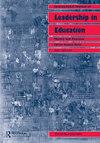Exploring the role of leadership in facilitating higher education internationalization in Japan: a mixed methods study
IF 2.5
Q1 EDUCATION & EDUCATIONAL RESEARCH
International Journal of Leadership in Education
Pub Date : 2023-10-17
DOI:10.1080/13603124.2023.2267008
引用次数: 0
Abstract
ABSTRACTAmid stiff competition in the burgeoning East Asian higher education market, Japan has implemented a series of internationalization initiatives to buoy its floundering HE sector. This study employed an explanatory sequential mixed methods design to explore Japanese and non-Japanese faculty and leaders’ views of effective leadership and its role in internationalization processes. Utilizing Bass’s full range leadership model, this study first elicited faculty and leaders’ (n = 162) views on three leadership constructs (transformational, transactional, and passive avoidant) using the Multifactor Leadership Questionnaire (MLQ). The results of the MLQ informed semi-structured interviews with five Japanese and five non-Japanese (n = 10) faculty and leaders, exploring their views regarding effective leadership and its role in internationalizing their institutions. The results suggest that while both groups identify transformational leadership as most effective, there is a significant difference in terms of how they perceive its efficacy. The qualitative analysis offered further insight into how cultural norms affect leadership in Japanese universities and offered ideas regarding how leaders can more effectively integrate non-Japanese faculty and develop cohesive, diverse faculty units. The results suggest the high degree to which leadership affects the readiness of Japanese institutions to adapt to an increasingly transnational landscape. Disclosure statementNo potential conflict of interest was reported by the author.Availability of data and materialAll data has been retained by the author on a secure, external hard drive.Code availabilityNVivo.Ethics approvalUniversity of Calgary’s Conjoint Faculties Research Ethics Board (ethics ID: REB19–1527).Consent to participateYour signature on this form indicates that 1) you understand to your satisfaction the information provided to you about your participation in this research project, and 2) you agree to participate in the research project.In no way does this waive your legal rights nor release the investigators, sponsors, or involved institutions from their legal and professional responsibilities. You are free to withdraw from this research project at any time. You should feel free to ask for clarification or new information throughout your participation.Consent for publicationAs with above.Additional informationFundingPartial financial support was received from Kwansei Gakuin University.Notes on contributorsBradley D. F. ColpittsBradley D. F. Colpitts is an educational researcher and instructor with more than 15 years of teaching experience. He holds a doctoral degree in educational leadership and a master’s of education in TESOL from the University of Calgary, Canada, and his research interests meet at the nexus of these two disciplines探讨领导力在促进日本高等教育国际化中的作用:一项混合方法研究
摘要在新兴的东亚高等教育市场竞争激烈的情况下,日本实施了一系列国际化举措,以提振其苦苦挣扎的高等教育部门。本研究采用解释性顺序混合方法设计,探讨日本和非日本教师和领导者对有效领导及其在国际化进程中的作用的看法。本研究采用巴斯的全方位领导模型,首先采用多因素领导问卷(MLQ),引出教师和领导者(n = 162)对三个领导结构(变革型、交易型和被动回避型)的看法。MLQ的结果为对五名日本和五名非日本(n = 10)教师和领导人的半结构化访谈提供了信息,探讨了他们对有效领导及其在机构国际化中的作用的看法。结果表明,虽然两组人都认为变革型领导是最有效的,但在他们如何看待其有效性方面存在显著差异。定性分析进一步深入了解了文化规范如何影响日本大学的领导力,并提供了关于领导者如何更有效地整合非日本教师和发展有凝聚力、多样化的教师单位的想法。研究结果表明,领导力在很大程度上影响了日本机构适应日益跨国格局的准备程度。披露声明作者未报告潜在的利益冲突。数据和材料的可用性所有数据都由作者保留在一个安全的外部硬盘驱动器上。availabilityNVivo代码。伦理审批卡尔加里大学联合学院研究伦理委员会(伦理ID: REB19-1527)。您在此表上的签名表明:1)您理解并满意提供给您的有关您参与本研究项目的信息,2)您同意参加本研究项目。在任何情况下,这都不会放弃您的合法权利,也不会免除调查人员、赞助商或相关机构的法律和专业责任。您可以随时退出本研究项目。在整个参与过程中,您可以自由地要求澄清或提供新的信息。同意发表上述资料。额外信息资金部分资金支持来自关西学院大学。作者简介:bradley D. F. Colpitts是一位教育研究者和讲师,拥有超过15年的教学经验。他拥有加拿大卡尔加里大学教育领导博士学位和TESOL教育硕士学位,他的研究兴趣在这两个学科的联系上
本文章由计算机程序翻译,如有差异,请以英文原文为准。
求助全文
约1分钟内获得全文
求助全文
来源期刊

International Journal of Leadership in Education
EDUCATION & EDUCATIONAL RESEARCH-
CiteScore
5.10
自引率
14.30%
发文量
65
期刊介绍:
International Journal of Leadership in Education: Theory & Practice is an international journal for the publication of theoretical and practical discussions of educational leadership. The Journal presents: •cutting-edge writing on educational leadership, including instructional supervision, curriculum and teaching development, staff development, educational administration and more; •an alternative voice: reports of alternative theoretical perspectives, alternative methodologies, and alternative experiences of leadership; •a broad definition of leadership, including teachers-as-leaders, shared governance, site-based decision making, and community-school collaborations.
 求助内容:
求助内容: 应助结果提醒方式:
应助结果提醒方式:


